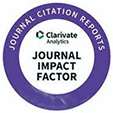YOGYAKARTA AIR BORNE QUALITY BASED ON THE LEAD PARTICULATE CONCENTRATION
Zaenal Abidin(1*), Sunardi Sunardi(2)
(1) Polytechnic Institute of Nuclear Technology, Babarsari St. PoBox 6101 YKBB Yogyakarta 55281 Indonesia
(2) Centre for Accelerator and Material Process Technology, Babarsari St. Babarsari St. PoBox 6101 YKBB Yogyakarta 55281 Indonesia
(*) Corresponding Author
Abstract
Analysis of Yogyakarta air quality based on concentration of lead particulate using Fast Neutron Activation Analysis (FNAA) method has been done. The sample was taken 3 times in 16 strategic locations of Yogyakarta city using Hi-Vol air sampler that equipped with cellulose filter TFA 2133. The sample irradiated for 30 min with 14 MeV fast neutron and then counted using gamma spectroscopy (AccuSpec). The result indicated that concentration of Pb-208 along Diponegoro street up to Janti street respectively are minimally (0.689 - 0.775) mg/m3, and maximally: (1.598 - 1.785) mg/m3. According to DIY governor decree No. 153/2002 about the limited toxicity ambient on Yogyakarta area it is concentration that Pb. The concentration of Pb-208 are still below the permitted value of 2 mg/m3, but in certain areas, the Pb concentration is almost equal to upper limit of permitted concentration of Pb.
Keywords
Full Text:
Full Text PDFReferences
[1] Santoso, E., 2006, Polusi Udara dan Sepeda Motor di Yogya, KR 15-1, 12,3-6, Yogyakarta.
[2] Haryando P., 2004, Pencemaran dan Toksikologi Logam Berat, Rineka Cipta, Jakarta.
[3] Nargolwalla, S., et al., 1973, Activation Analysis with Neutron Generators, John Wiley and Sons, New York.
[4] Dezco, Z., and Csikai, J., 1978, Fast Neutron Activation Analysis, IAEA training Course on Utilization of Neutron Generator, Debrecen.
[5] Gerhar, D.E., 1976, Neutron Activation Tables, Kernchemie in Einseldarstellungen, Vol.6, Verlag Chemie, weinheim, New york.
[6] Anonim, 2007, Informasi Cuaca Harian, Badan Meteorologi dan Geofisika, Stasiun Geofisika Yogyakarta, tgl 16 Maret, Yogyakarta,
[7] Anonim, 2007, Laporan Analisis Data Kualitas Udara dengan Metode Pasif dan Aktif di Provinsi DIY, Badan Pengendalian Dampak Lingkungan Daerah DIY.
[8] Retno, A. and Mukono, 2005, Air Pb Level, Blood Pb Level and Its Effects on The Health Disorders of Street Vendors in Surabaya, http://www.cleanairnet.org/caiaisa/1412/article-71625_Poster_6.doc. Access date March 4, 2009
[9] Hafizhotu, D., Ngasifudin, and Wisnu, A.W., 2005, Kemampuan Daun Perindang Jalan Menangkap Partikel Pb Dalam Udara Kota Yogyakarta, Prosiding Seminar Nasional dalam Rangka Dies ke 50, FMIPA UGM, Yogyakarta.
[10] Sunardi, Taftazani, A., and Saptaaji, R., 2003, Aplikasi Generator Neutron untuk Analisis Unsur Gas Buang Kendaraan Bermotor Roda Dua, Prosiding Pertemuan dan presentasi Ilmiah Teknologi Akselerator dan Aplikasinya, 5:1, P3TM-BATAN, Yogyakarta.
[11] Anak, A.G.S, 2008, Jurnal Bumi Lestari, 8, 2, 162-167.
[12] http://www.kompas.com diakses tanggal 23 April 2007
[13] Kinta, D.A., 2007, Tugas Akhir D IV, Program Studi Teknokimia, Sekolah Tinggi Teknologi Nuklir, Yogyakarta.
Article Metrics
Copyright (c) 2010 Indonesian Journal of Chemistry

This work is licensed under a Creative Commons Attribution-NonCommercial-NoDerivatives 4.0 International License.
Indonesian Journal of Chemistry (ISSN 1411-9420 /e-ISSN 2460-1578) - Chemistry Department, Universitas Gadjah Mada, Indonesia.











